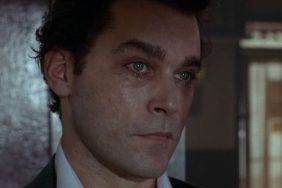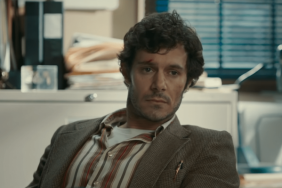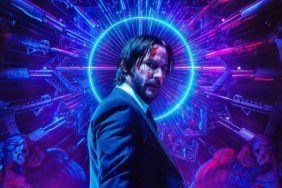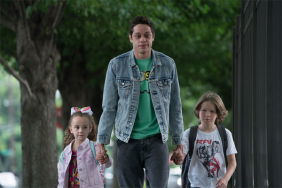This week, the impressively cast London Boulevard will be released on Blu-ray and DVD. Trust me, it has some British actors you like in it. We all like David Thewlis and Ray Winstone, right? Well, I do. And it’s written and directed by William Monahan, the Oscar-winning writer of The Departed. As such, we’re thinking about gangster movies, and, as is our wont, we’re compiling lists.
Oh my, there are so many great gangster films. Ever since the 1930s, rich, well-dressed, weapon-toting gangsters have risen to a strange and romantic place in our cinematic imaginations. Ever since, we’ve been treated to the morally bankrupt, close-knit family of suave and collected career criminals who have made a large and complex structure out of swindling, theft, murder, and extortion. And yet, we’ve loved the gang guys, their devotion to their work, and their strict adherence to a well-thought out structure. When we see a gangster’s life in action, we entertain violent power fantasies about living in that life. However evil these men may be, and however many people they may kill, we still admire them, and go back to their movies time and again.
I, then, have compiled the following list of five excellent gangster movies to mull over. You’ve probably seen most of these. If you haven’t, consider this a strong recommendation.
N.B. I have not included The Godfather on this list. Don’t write to complain. I wanted to steer clear of the obvious champ. There are other reasons for leaving it off, but if I told you what they were, I’d have to kill you.
The Untouchables (dir. Brian De Palma, 1987)

David Mamet wrote Brian De Palma’s very slick and melodramatic telling of Eliot Ness’ true-life attempts to apprehend the famous suerpcriminal Al Capone. In the late 1920s, Capone was riding high in the gangster circuit, and the local police departments were corrupted to the gills. Eliot Ness, personally selected by President Hoover, was assigned the task to taking him down. Ness proceeded to assemble a crack squad of supercops to do some fresh and insular investigation all on their own. The team was called “The Untouchables.”The world got to know them through the famous TV series from the 1950s and ’60s. In 1987, the feature film version came out, and while it wasn’t necessarily 100% factually accurate (and what big-budget Hollywood historical film ever is?), it was a thrilling look at the rivalry. Ness was played by a stone-faced Kevin Costner, and Capone was played by Robert De Niro. Sean Connery played the plainspoken Scottish beat cop who kept Ness on the straight-and-narrow. The style of the film is a bit over-the-top, but taut and fun. Big-time Hollywood filmmaking at its finest.
Branded to Kill (dir. Seijun Suzuki, 1967)

Not too many casual cinephiles know the name of Seijin Suzuki, but he could easily be credited as the inventor of the modern day phenomenon of criminal cool. In the late 1960s, he made a series of stylish gangster movies about flip and laidback assassins and criminals who reacted with indifferent dismissal of their murderous jobs. His heroes often wore sunglasses, had perfectly combed hair, and wore some of the sharpest suits this side of Jean-Pierre Melville. His best is probably 1967s Branded to Kill, as it not only has a cool-as-ice hero, but includes a good healthy dose of bizarro sexual undertones that nudge it comfortably toward camp. Jo Shishindo plays a hitman named Hanada who blows a hit, and finds himself, in turn, being stalked by a second mysterious hitman named merely “#1.” He is also being berated and browbeaten by his Lady MacBeth-like wife over the matter. Oh yes, and he has a weird need to smell boiled rice whenever he can. Branded to Kill is almost like a Douglas Sirk soap opera. It’s well made and goodly weird.
City of God (dir. Fernando Meirelles and Kátia Lund, 2002)

Not all gangsters wear nice suits and live in posh apartments. Some of them are glorified street gangsters who manage to climb through a deep, deep institution of violence to become the leader of a very loose-knit group of other street thugs, who start killing each other in drug wars as early as age 8. City of God, one of the best films of the ’00s, traces the tragic growth of such a system in the poverty-stricken favelas of Rio de Janeiro. The Brazilian government helped to build Rio’s poor shanty town decades ago, and the poor section became so undesirable that it started to spawn one of the most horrifying, crime-ridden gang institutions in the entire world. The film follows a young would-be photographer (Alexandre Rodrigues) who plans on escape one day to document this dangerous wilderness of criminal activity (once you’ve made your way to a place where you can survive, the gangs will most certainly not allow you to leave), but his story is secondary to the fascinating dissection of the way criminal systems get started. Raw, saturated, violent and smart, City of God is awesome.
The Public Enemy (dir. William A. Wellman, 1931)

And speaking of the way criminals get started, no list of gangster movies would be complete without the inclusion of The Public Enemy, the 1931 classic that essentially defined the way gangsters behave. James Cagney plays a hoodlum named Tom Powers who ambitiously climbs upward to rule a local Chicago mob sect. He wants to make a living and land a cute girlfriend (he lands Jean Harlow), but he does it mostly to impress his Ma (Beryl Mercer). The entire gangster lifestyle probably finds its origins in the bootlegging businesses that sprang up during the dangerous prohibition era. Since then, gangsters have branched out. And while they were seen as, well, public enemies, Cagney’s edgy and electrifying performance made the gangster life look fun and wicked. And it always had some of the nicest suits. The impact of The Public Enemy was so great that real-life gangsters begins emulating James Cagney, dressing the way he did in the film, and even affecting his mode of speech. Cagney would make a brief career of playing gangsters. Thanks to him, the crime world itself changed.
GoodFellas (dir. Martin Scorsese, 1990)

Scorsese has made several impressive films about the mob, petty criminals, and other tortured souls who live in a world of crime. The best of these, though, is probably his 1990 classic GoodFellas, which contains everything you want a crime flick to contain. As far back as Henry can remember, he always wanted to be a gangster. He falls in with a powerful father figure (Robert De Niro) and a feisty psychopath (Joe Pesci), and proceeds to climb through the ranks of his local mob. Henry is seen as a kind of wide-eyed innocent, but in the violent, murder-committing side of that notion. He is impressed by everything he sees, and, as hubris and ambition dictate, constantly wants more. Henry’s pride, however, is not his undoing, but his willingness to dip into drugs. You might note this about gangster movies: whenever drugs enter the equation, everything falls apart. Remember kids, it’s okay to enter into a world of corruption and immorality, but stay away from the cocaine.
Full Disclosure: This article is sponsored by IFC Films.






